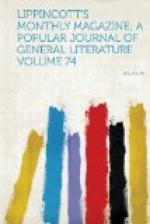The remedy that has been most frequently suggested, the only one recommended by the Emigration Commissioners in 1841 and by Sir John McNeil in 1852, is emigration. The crofting system, it has often been urged, belongs to a bygone age; it survives only because of its remoteness from the centres of civilization and the ruggedness of the country; the implements used by the crofters are of the most primitive sort, while their agricultural methods are “slovenly and unskilful to the last degree.” It is impossible for these small farmers, with their crude implements and methods, to compete with the large farmers, who have better land and use the most improved implements and methods. Besides, many of the crofters are, and their ancestors for many generations have been, “truly laborers, living chiefly by the wages of labor, and holding crofts and lots for which they pay rents, not from the produce of the land, but from wages.” If they cannot find employment within convenient distance of their present homes, the best and kindest thing for them is to help them to go where there is a good demand for labor and better opportunities for earning a decent livelihood. To encourage them to stay on their little crofts, where they are frequently on the verge of want, is unkind and very bad policy. One who has seen the wretched hovels in which some of these crofter families live, the small patches of unproductive land on which they try to subsist, the hardships which they sometimes suffer, and the lack of opportunities for bettering their condition in their native Highlands or islands, and who knows how much has been accomplished by the enterprise and energy of Highlanders in other parts of the world, can hardly help wishing that they might all be helped to emigrate to countries where their industry and economy would more certainly be rewarded, and where they would have a fairer prospect for success in the struggle for life and advancement. Many of them would undoubtedly be far better off if they could emigrate under favorable conditions. The descendants of many of those who were forced to leave their homes by “cruel and heartless Highland lairds,” and who suffered terrible hardships in getting to this country and founding new homes, have now attained such wealth and influence as they could not possibly have acquired among their ancestral hills. The Royal Commissioners recommended that the state should aid those who may be willing to emigrate from certain islands and districts where the population is apparently too great for the means of subsistence.
The crofters are, however, strongly attached to their native hills and glens, and they claim that such laws can and ought to be enacted as will enable them to live in comfort where they are. The present, it is urged, is a particularly favorable time to establish prosperous small farmers in many parts of the Highlands where sheep-farming has proved a failure. The inhabitants of the coasts and islands are largely a




